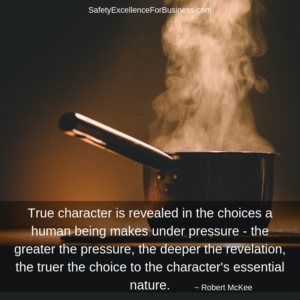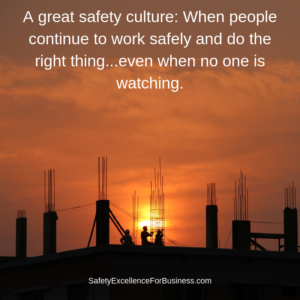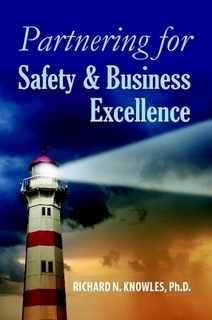Safety gets better when there’s Engagement and Respect happening!
The Occupational Health & Safety Survey
The State of Employee Safety in 2023 survey was published by Alert Media in Occupational Health and Safety.1 They surveyed 2000 full-time workers in the USA.
About 80% of the employees felt their safety was more important than productivity and job satisfaction. They all felt that their employers did not have as a high a value for any of these things. This was also true for mental health issues. Almost half of the employees are concerned about public health emergencies, workplace violence and technology failures.
About a third want better communications, more information about injuries and incidents as well as better safety training.
Reflections on the Feedback
In reflecting on the survey, the employees were fairly positive. It seems as though the people really want to be more a part of what is going on. While most of them care about their own safety, they feel that their managers do not care so much. They also feal that they are being left out of things. They want to know more about what is going on, not only about the things happening in their on workplace, but also about things going on outside of work that can impact them.

They want to know what the managers are thinking about. The employees also have ideas that they would like to share. They want better communications, as well as safety training. These are all good. But there is a sense that their managers do not have the same level of concern for their safety and health.
There was not much about what the employees could do to improve things. It is not just the managers who can make a positive difference, everyone can do that. This survey opens the door for good conversations about how things can get better.
Going Forward
In my experience, most people want to be treated with respect, be heard and have their ideas given consideration. As the managers and employees talk together, a lot of learning will take place. People will become more engaged and contribute more towards the organization’s success.
Sometimes managers hesitate to be more open and share for fear that they will loose control of things. As a manager for many years, I found that when I had my thinking and messages clear, I could talk openly with the people. We could set the standards and formulate the direction we needed to go. Then as we talked together, the people began to come together working towards really improving things, so I actually had better control in helping the organization to achieve success. Safety improved, productivity improved, and earnings improved.

While this sounds fairly simple, I have found that many managers try to avoid talking with the people. Managers are supposed to know what is going on and be able to answer questions so when they are asked a question they can’t answer, they feel as if they have failed. I struggled with this in my early, manager days until I accepted the fact that I did not know all the answers, and that was okay. No one knows everything, we all know that so let’s accept this and learn together. When I made this shift in my thinking, things got a lot better and much easier. I did not have to pretend that I knew everything, and fear that someone would embarrass me. When someone asked a question I couldn’t answer, I told them I did not know the answer, and then got back to them promptly when I did get the answer.
The more we interacted, talking and learning together, everything improved, and my job got a lot easier. I spent a lot more time being a cheer leader which was fun.
Everywhere I have worked, I found that treating people with respect, listening to their ideas, talking together, getting clear on the standards of performance, co-creating our goals and praising them for their successes was the formula for our successes. A lot fewer people got injured and the company made a lot more money.
 Our businesses, our schools and hospitals, our governments, and not-for-profits, at all levels, are fractured and coming apart. Change is coming faster and faster. So many people seem to be trying to cope by pulling into their shells and trying to push the turmoil all away. The trust levels among all the various groups is very low. So many loud voices are pushing their version of the “truth” that it is almost impossible to tell who is being honest and should be listened to. How do we find the truth?
Our businesses, our schools and hospitals, our governments, and not-for-profits, at all levels, are fractured and coming apart. Change is coming faster and faster. So many people seem to be trying to cope by pulling into their shells and trying to push the turmoil all away. The trust levels among all the various groups is very low. So many loud voices are pushing their version of the “truth” that it is almost impossible to tell who is being honest and should be listened to. How do we find the truth? In thinking about your own place of work, what do you suppose it would be like if people did some of the things mentioned earlier in this newsletter? Do you think that you could begin talking with others about building a more respectful environment? What do you think it would be like if you could openly talk together about the important issues like improving the safety of your job? What would it be like if the managers and supervisors talked frequently about with everyone about how the business was doing the challenges from the competition? What would it be like if you knew that someone was looking out for your back? What would it be like if you felt you were in an environment of trust? What would it be like if people really asked important questions and talked about them? What would it be like if people in upper management asked you for your honest opinion and really listened? That’s called breaking the iceberg and engaging in authentic conversations!
In thinking about your own place of work, what do you suppose it would be like if people did some of the things mentioned earlier in this newsletter? Do you think that you could begin talking with others about building a more respectful environment? What do you think it would be like if you could openly talk together about the important issues like improving the safety of your job? What would it be like if the managers and supervisors talked frequently about with everyone about how the business was doing the challenges from the competition? What would it be like if you knew that someone was looking out for your back? What would it be like if you felt you were in an environment of trust? What would it be like if people really asked important questions and talked about them? What would it be like if people in upper management asked you for your honest opinion and really listened? That’s called breaking the iceberg and engaging in authentic conversations! For example, the workers on the Deepwater Horizon drilling platform received good recognition for outstanding occupational safety performance (the slips, trips and falls sorts of incidents) just a day or two before the explosion on April 20, 2010, that killed 11 people and injured 17 others. The pressures from top management to get into production led to failures of their process safety management (PSM) systems and processes. Communications were limited because management did not want to hear of more problems; they were driving the production schedule. The fine occupational safety performance masked the PSM deficiencies which are more subtle and invisible to upper managers, unless they are keenly aware of the needs for excellent PSM.
For example, the workers on the Deepwater Horizon drilling platform received good recognition for outstanding occupational safety performance (the slips, trips and falls sorts of incidents) just a day or two before the explosion on April 20, 2010, that killed 11 people and injured 17 others. The pressures from top management to get into production led to failures of their process safety management (PSM) systems and processes. Communications were limited because management did not want to hear of more problems; they were driving the production schedule. The fine occupational safety performance masked the PSM deficiencies which are more subtle and invisible to upper managers, unless they are keenly aware of the needs for excellent PSM. Now we have another example with the mess at Boeing and the 737 Max crashes. Top management was feeling the pressures for market share from Airbus and putting terrific pressures on cost reduction and faster production.
Now we have another example with the mess at Boeing and the 737 Max crashes. Top management was feeling the pressures for market share from Airbus and putting terrific pressures on cost reduction and faster production. This is quite attainable with authentic, courageous leaders who take a stand that this is the sort of place they want to lead. The knowledge and technology are available and broadly known by lots of people so I want to share my own experiences.
This is quite attainable with authentic, courageous leaders who take a stand that this is the sort of place they want to lead. The knowledge and technology are available and broadly known by lots of people so I want to share my own experiences. This all began with my determination to work on improving respect, civility and safety. As I built credibility and trust with everyone, people began to make improvements in many other areas. Everything got better.
This all began with my determination to work on improving respect, civility and safety. As I built credibility and trust with everyone, people began to make improvements in many other areas. Everything got better.




